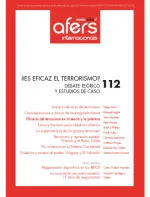Refraining from terror: the puzzle of non violence in Western Sahara

In Western Sahara, the former Spanish colony occupied by Morocco since 1975, virtually no violent resistance has been mounted by the indigenous Sahrawi people since the end of the 1975-1991 war between Morocco and the pro-independence Polisario Front. This absence of violence is puzzling in the light of several factors: the widespread public support for independence; the social and economic disparities between Moroccan and Sahrawi inhabitants of the territory; and Morocco’s brutal repression of Sahrawi culture, resistance, and expressions of proindependence feeling. This article examines the logic of violence (and its absence) and of resistance, and draws lessons from Western Sahara. As well as advancing theoretical development, the article makes a methodological contribution to the study of resistance, and improves our understanding of the Western Sahara conflict through fieldwork, including around 60 interviews with Sahrawi activists conducted in the summer of 2014.
Key words: non violence, pro-independence,repression, Western Sahara, Morocco
>> The full text articles of this issue are available only in Spanish language
DOI: doi.org/10.24241/rcai.2016.112.1.149